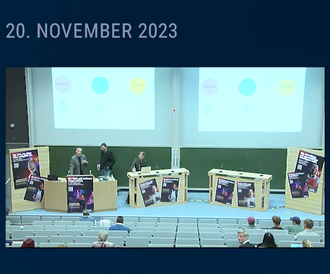Video »Biases und Generative KI« vom Digital-Gipfel der Bundesregierung 2023
»Biases und Generative KI«
Ob und in welchem Maße können generative, KI-basierte Informationssysteme eigentlich objektiv sein und unvoreingenommene Informationen liefern? Dies diskutierte Prof. Dr. Benno Stein, Professor für Intelligente Informationssysteme im Fachbereich Medieninformatik an der Bauhaus-Universität Weimar, gemeinsam mit Prof. Dr. Matthias Hagen von der Friedrich-Schiller-Universität Jena und Prof. Dr. Martin Potthast von der Universität Leipzig.
Jährlich richtet die Bundesregierung ihren Digital-Gipfel aus, einen Kongress, der die Herausforderungen des digitalen Wandels in Deutschland thematisiert. Dieses Jahr fand der Digital-Gipfel am 20. und 21. November in Jena statt. Bei dem Gipfel interagierten Teilnehmende aus Wirtschaft, Wissenschaft und Zivilgesellschaft direkt mit der Bundesregierung und hatten die Möglichkeit, sich zwei Tage lang vor Ort über Chancen und Möglichkeiten der Digitalisierung auszutauschen. Zentral war die Frage: Wie können wir mithilfe digitaler Technologien unsere Zukunft nachhaltig und lebenswert gestalten?

Prof. Dr. Benno Stein (Bauhaus-Universität Weimar, Fakultät Medien) u.a. im Rahmen des Digital-Gipfels der Bundesregierung 2023
Click the Play button to load and view external content from Vimeo.com.
Automatically load and view external content from Vimeo.com (You can change this setting at any time via our »Data protection policy«.)

